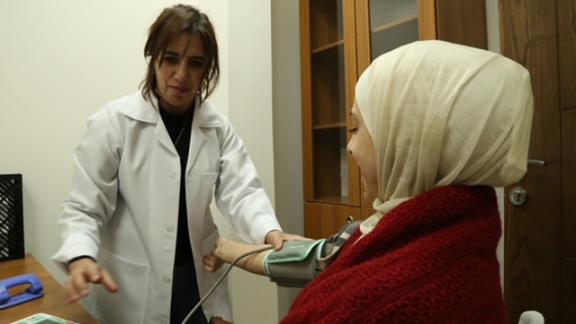Nama Abu Khalifa, a social worker with the Palestinian Family Planning and Protection Association (PFPPA) in the occupied West Bank, faces near-impossible challenges in getting to work every day.
"Every morning and evening, I undergo physical inspection by the Israeli occupation forces at the checkpoints,” she said. “Additionally, there are armed settler attacks on the roads, attempts to intimidate passersby, and the placement of iron gates to close the entrances and exits of the village, tightening the grip on its residents. The gates are closed and opened without any prior warning, making it difficult for me to return home."
Abu Khalifa works for the Ramallah branch - one of four PFPPA service delivery points across the West Bank that are still operational, despite tightened security and rising violence in the West Bank amid the ongoing war in the Gaza Strip. PFPPA’s only health center in the Gaza Strip was destroyed after an Israeli air strike hit an adjacent building on 8 October.
While all eyes are rightfully on the dire situation in Gaza, Israeli settler violence and increased movement restrictions in the West Bank mean Palestinians are also facing increasing challenges and risks when it comes to seeking sexual and reproductive health care. Attacks, forced displacement, rampant discrimination and harassment by Israeli forces continue – and have increased in the last month. According to the OCHA, nearly 2,000 Palestinians have been displaced amid settler violence since 2022, with 43% since 7 October, severely limiting Palestinians’ access to essential services. As of 20 November, the total number of Palestinians killed by Israeli forces in the West Bank, including East Jerusalem, is 200, including 52 children.
when
country
Palestine
region
Arab World
Subject
Humanitarian
Related Member Association
Palestinian Family Planning and Protection Association (PFPPA)

The soldier began shooting, and we had to run until we found a place to hide on the other side. I reached work trembling, and crying… I felt like I couldn’t breathe.

Checkpoints and barriers obstructing access to various West Bank villages are common, thwarting the delivery of health services. So far, there have been two instances of pregnant women giving birth prior to crossing the checkpoint to reach a secure health facility - there will likely be many more. According to the UNFPA, around 73,000 women are currently pregnant in the West Bank, with more than 8,120 expected to give birth in the next month as the violence threatens to spill over.
For her part, Abu Khalifa has done everything in her power to continue serving clients, including creating WhatsApp and Facebook groups to answer sexual and reproductive health questions and provide remote counseling. She has also been in contact with local community-based organizations to conduct sessions for village residents that focus on stress and anxiety management during emergency situations for themselves and their family members.
“A number of our team members have family and loved ones in Gaza. They live in continuous fear and anxiety of the fate of their family, friends, neighbors, acquaintances. Although they are always trying to get in contact, they do not receive responses often…. Being away and not knowing what is happening to so many is terrifying,” she said.
Fatima Abu Awad is a nurse at PFPPA’s service delivery point in Halhoul, south of the West Bank. Like Abu Khalifa, she faces enormous challenges and significant danger in getting to work.
“One day when trying to reach our work, we spent a long time searching for alternative side roads to take as all the main roads and entrances have been closed off between cities and villages, as is the case in many areas of the West Bank,” she said. “Our final resort was to walk through the checkpoint to meet another car on the other side. As we were crossing by foot, a soldier from the watchtower instructed us to go back and not to walk. We were stuck. Going either forward or back was dangerous. The soldier began shooting, and we had to run until we found a place to hide on the other side. I reached work trembling, and crying… I felt like I couldn’t breathe.”

I acknowledge the importance that my work can make on people’s lives… and that regardless of the circumstances that we face, these services must be available.

Even in the face of such dangers, staff of PFPPA are committed to continue delivering services and support for sexual and reproductive health, including preventing and responding to gender-based violence. Already, cases of gender-based violence have been addressed via PFPPA’s hotline, and, as in all crises, these cases are likely to increase as the situation deteriorates in the West Bank.
PFPPA has also been working in collaboration with the UNFPA to distribute Dignity Kits, which include basic items such as menstrual pads, bath soap, undergarments, detergent powder, sanitary napkins, toothpaste, a toothbrush, and a comb, so women and girls can maintain their dignity. These kits have already been provided to women from Gaza who had received medical treatment or were accompanying a relative who was receiving treatment in the West Bank. They have been unable to return home due to the blockade and attacks on the Gaza Strip.
“Nothing in Palestine is for sure safe or secure for anyone, but we are determined to do all we can to ensure our services are available,” said Abu Awad, the nurse.
Abu Khalifa, the social worker, echoes this sentiment: “I acknowledge the importance that my work can make on people’s lives… and that regardless of the circumstances that we face, these services must be available.”










